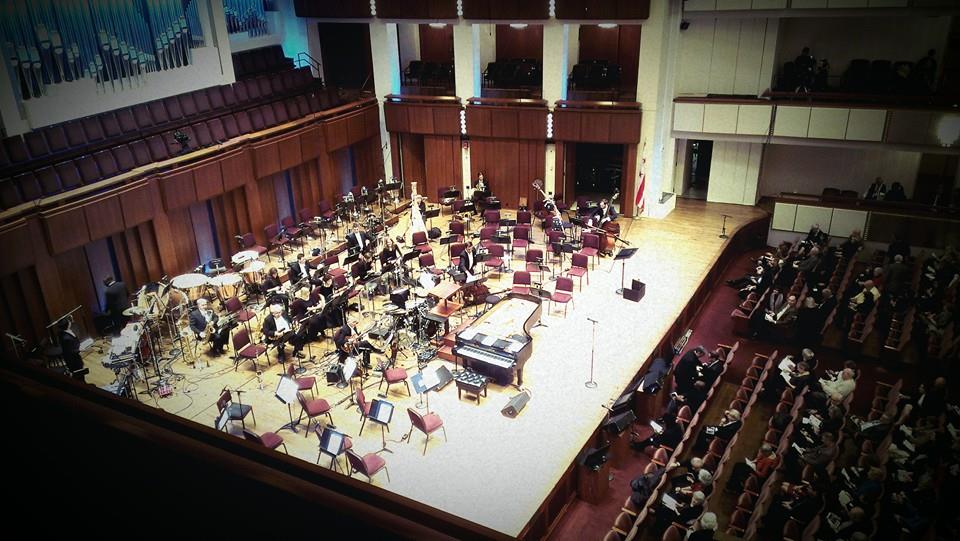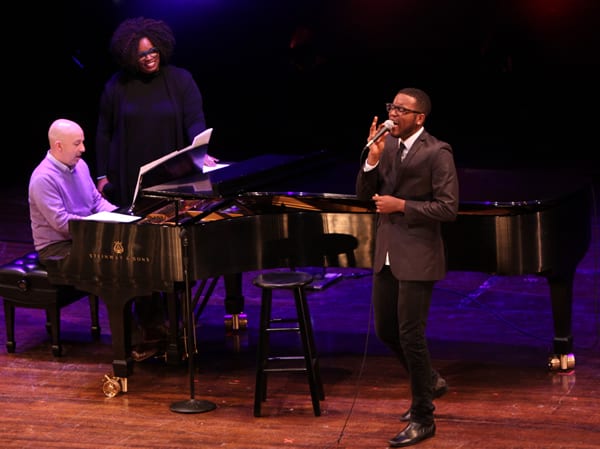American Voices with Renée Flemming
I was fortunate to purchase tickets far enough in advance (almost 10 weeks) for last weekend’s program at the Kennedy Center, hosted by Renée Fleming. It entailed 6 masters classes and concluded with a star-studded concert Saturday night. I attended the concert as well as the Vocal Jazz and Pop masters classes, which were fascinating.
Vocal Jazz Master Class

Dianne Reeves led the jazz class in the Terrace Theater, which entailed four voice students about a couple hundred of us spectators. Each student took a turn singing a song, after which Ms Reeves worked with them to improve certain aspects of their performance.
The best part was when she’d have the singer re-sing part of the song while focusing on a particular interpretation technique. In every case, the difference was immediately tangible. The crowd was quick to reward the singers after – or during – their transformation, as it was thrilling to witness. It was also a bit terrifying to picture yourself in the students’ shoes! They were all very brave souls.
The biggest point Ms Reeves made throughout the class had nothing to do with vocal technique, like I expected. Rather, she focused mostly on phrasing. She had everyone speak the lyrics of their song, and continually urged them to say it how they would speak it, not how they’d been singing it. Once she got them to speak it naturally, she had them sing it again and suddenly the performance was so much more real. It was as if she’d pointed a spotlight at them.
After the students were done (each one going for 15-20 minutes), Ms Reeves was joined by a panel moderated by Ms Felmming that included music industry executives and jazz singer Kurt Elling. This part wasn’t quite as inspiring, but nevertheless it was very educational to hear their ideas and watch them converse.
Pop Master Class
The pop class was led by Sara Bareilles and Ben Folds, also in the Terrace Theater. The format was the same, but the before-and-after difference wasn’t quite as stark. Whereas the jazz singing made perfect sense to me (sing your own interpretation of a jazz standard), I wasn’t sure exactly what the goal was for covering pop/rock tunes. Are you trying to sound just like the original? Trying to do your own vocal interpretation in the original genre? Trying to sing it in a new genre? Perhaps all of the above.
In any case, the conversation focused most often how the song could be arranged: more dynamics, less belting, and tempo alterations. Other topics included audience interaction and being fresh with songs you’ve sung hundreds of times.
Another contrast from the jazz class: it’s assumed that Ms Reeves previously knew, and has likely sung, each of the standards that the students chose. Sara & Ben, however, freely admitted to not really having heard two of the four tunes. Jazz has a few hundred standards that everyone knows and plays (“The Great American Songbook”), whereas pop/rock are made fresh and shipped in the hundreds every year and therefore much harder to keep up with.
Although not as thoroughly educational, the pop class had a higher enjoyment factor. Sara & Ben were very natural, quite funny, and very entertaining to watch. They were very supportive of the students, and we felt like, if not friends, at least contemporaries.
The Concert
The big concert finale was good to see, but we were surprised to find it a bit disappointing. Anne Midget mentions some of the same shortcoming in her Washington Post review which made the performance less top-notch than we expected.

Firstly, it was strange that most of the music was accompanied by the National Symphony Orchestra. This works well for the operatic and Broadway musical genres, but when we got into some other genres like gospel and jazz it felt forced.
Josh Groban opened the show, but like the rest of the singers, never spoke. I think we’d have been much better served if the singers had participated in conveying messages about the weekend’s overall theme: the American Voice. Rather, we only heard from Ms Flemming, whose narrative loosely connected each piece to the next, and aside from a couple of threads about uniqueness and America, seemed like filler. Perhaps it was just too hard to listen when there were so many megastars to see.
But that didn’t bother me as much as the entire program. Our theory is that someone on Ms Flemming’s team put it together with little or no input from the singers as to 1) the genres/songs they sing best, or 2) the best single song to showcase that genre. Input regarding both areas would have helped the show live up to its potential … or at least kept the energy going. Instead, we flipped through world-famous superstars singing ambiguous songs that didn’t highlight their voices. Most only sang one song, then disappeared until the awkward and decidedly untriumphant finale, which didn’t leave us hungry for more as much as wondering what we’d ordered.
The highlight of the show, for me, was the result of Kurt Elling having to cancel his portion of the show. Rather, two of the jazz students we’d seen in the masters class were announced! What an opportunity for them – albeit it potentially terrifying!
The first was a Kate Davis from Portland, OR, who sounds an awful lot like Blossom Deary in voice, but has the whole Esperanza Spalding thing going instrument choice. Although we’d only heard about her bass the night before, she brought it out with her and totally jazzed up the room. She sometimes seemed more focused on the bass than her singing, but certainly seems to be on the way.
She was followed by Michael Mayo, a lanky singer from California with a distinctive voice which he uses in many ways. He sang “All of Me,” with a typical-looking jazz trio plucked from the orchestra. He didn’t seem too nervous up there, but I would’ve like to hear a verse sung relatively straight through before messing with it. His scat verse, however, was superb.
Final Take
All of that being said, Ms Flemming was a gracious and likeable host throughout the weekend and we’d certainly get tickets to another one of these festivals … only this time we’d go to more of the master classes and reconsider the final concert.
